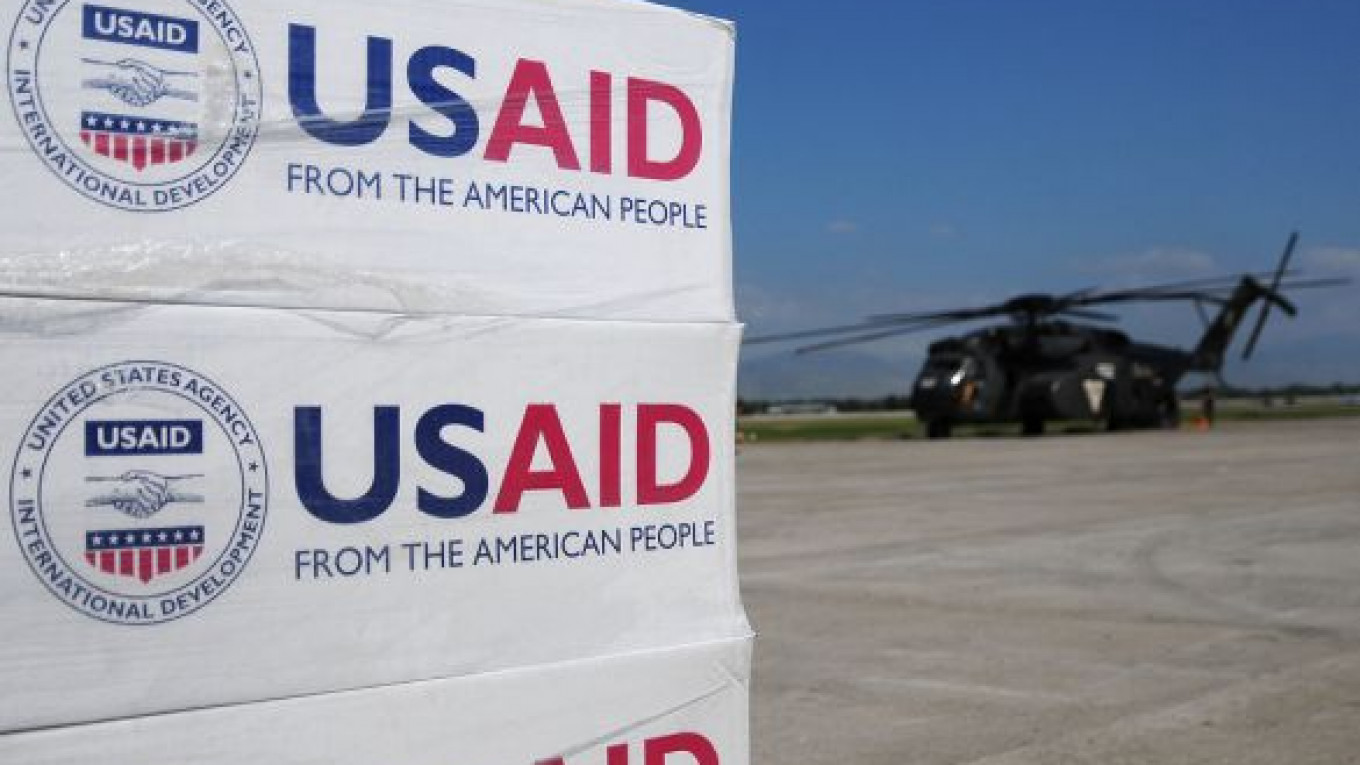On Monday, the same day that the U.S. Agency for International Development ended its 20-year presence in Russia, President Vladimir Putin proposed bringing nonprofit groups that provide social services under closer government supervision.
A plan outlining criteria for evaluating the quality of services provided by nonprofits, as well as a public ratings system, should be finalized by April 1, Putin said Monday, Interfax reported.
He also told a group of pensioners that the government would boost funding for nonprofits to 3 billion rubles ($96 million).
Fifty-seven nonprofits operating in Russia, from human rights watchdogs to HIV/AIDS prevention groups, are set to lose out on millions of dollars in U.S. government grants following the Kremlin's decision to kick out USAID, which was announced last month.
The Foreign Ministry said USAID used grants to try to influence Russian politics, including elections and civil society institutions.
Like many NGOs, election monitor Golos, whose reports of violations during the State Duma elections in December helped spark massive street protests, has reacted with a mix of defiance and disappointment.
"We will continue monitoring [elections] no matter what," Golos said in a statement at the time.
On Monday, Golos director Lilia Shibanova struck a somewhat less strident chord, saying the organization would monitor the Oct. 14 municipal elections as planned, barring any additional "news."
This is because nonprofits can spend grant money that they've already received, she said.
Asked whether Golos had found any new donors, Shibanova laughed. "Of course not, you can't find additional financing that fast." New grants would take six months or more to materialize, she said.
Golos expects to provide an online map of elections violations, a free hotline, and training for vote monitors in 22 regions, the statement said.
Despite USAID's eviction and a new law compelling nonprofits that receive foreign funds to register as "foreign agents," Putin insisted that Russia's policy regarding nonprofits was unrestrictive.
"We don't have any limits or bans on NGOs' use of funds and aid, including that provided by foreign donors. This will only be welcomed," he said Monday.
Alexei Malashenko, an analyst with the Carnegie Center, said Monday's announcement was part of a larger trend of expanding government control.
"If you look around, you will see that in practically all directions, [Putin] does the same thing. It's very bad, and I can't imagine that he will be able to change something," he said by telephone.
Yelena Gerasimova, director of the Center for Social and Labor Rights, which received USAID funding, doubted whether a ratings system or additional funds would be useful or fair.
Three years of applying for grants through the Public Chamber had yielded nothing, and even if they had, Russian government grants tend to be small, narrowly focused and wrapped in red tape, she said by telephone.
"Who's going to do the evaluations? How are they going to be developed? How are they going to be carried out? There are many more questions than answers," she said.
The loss of USAID funding will hit nonprofits differently, depending on their revenue streams.
Perspektiva, which defends the rights of people with disabilities, was set to lose about a third of its budget, director Denise Roza said by telephone last month. Public health advocate University Research Company was faced with completely halting operations in Russia, director Viktor Boguslavsky said at the time.
Other organizations interviewed by The Moscow Times said they would do their best to carry on, freezing USAID-funded projects and looking for additional sponsors while trying to maintain existing projects and staff.
Davron Mukhamadiyev, head of the IFRC's office in Russia, said the demise of USAID would accelerate a trend of decentralization for his organization, in which Red Cross projects are handed over to local partners.
"Our main focus for the last two to three years was how to shift this kind of support from international sources to local sources. In many regions, local authorities have already adopted special legislation, including special expenses for counseling and other support for tuberculosis patients," he said by telephone.
For example, the Red Cross will now consider handing over a program that provides counseling and other support to about 650 patients in the outpatient phase.
USAID spent $54.2 million in Russia in 2011, almost half of which ($22.2 million) went to projects related to human rights, democracy and governance, according to official data.
The U.S. Embassy announced on Sept. 18 that Russia was pulling the plug on USAID, which had operated in Russia since 1992 and spent a combined $2.6 billion on civil society grants.
Ambassador Michael McFaul said U.S.-Russian relations were "active and strong" when asked during a Q&A session on Twitter on Wednesday whether the Kremlin's decision would hurt relations.
Related articles:
A Message from The Moscow Times:
Dear readers,
We are facing unprecedented challenges. Russia's Prosecutor General's Office has designated The Moscow Times as an "undesirable" organization, criminalizing our work and putting our staff at risk of prosecution. This follows our earlier unjust labeling as a "foreign agent."
These actions are direct attempts to silence independent journalism in Russia. The authorities claim our work "discredits the decisions of the Russian leadership." We see things differently: we strive to provide accurate, unbiased reporting on Russia.
We, the journalists of The Moscow Times, refuse to be silenced. But to continue our work, we need your help.
Your support, no matter how small, makes a world of difference. If you can, please support us monthly starting from just $2. It's quick to set up, and every contribution makes a significant impact.
By supporting The Moscow Times, you're defending open, independent journalism in the face of repression. Thank you for standing with us.
Remind me later.






